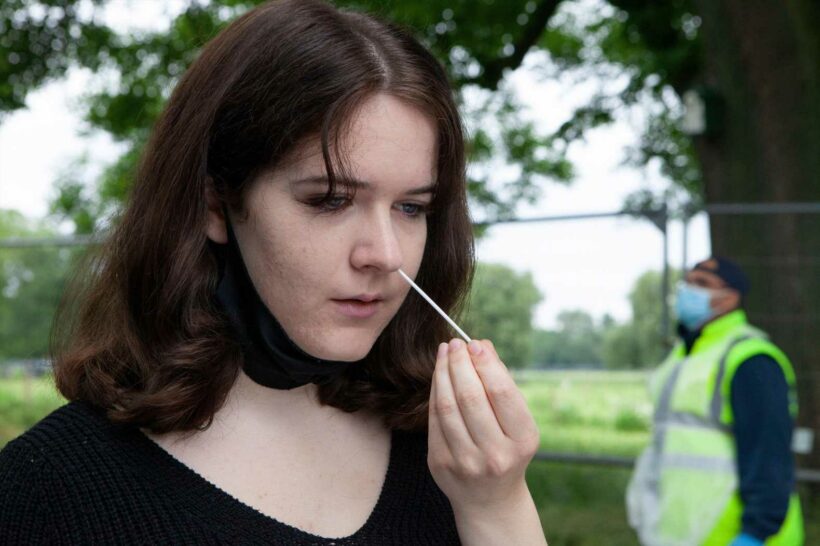COVID cases are still rising and the Delta strain is to blame.
Some parts of England are more affected than others with several hundred cases per week.
🔵 Read our coronavirus live blog for the latest updates
The Delta variant – first identified in India – accounts for at least 95 per cent of infections, having become the dominant type in circulation within a matter of weeks.
It's rapid growth derailed the original lockdown easing roadmap in England which would have seen all restrictions ended on June 21.
But a four-week delay to July 19 has allowed for millions more vaccines to be given.
The PM and new Health Secretary Sajid Javid are keen to end the remaining measures “as soon as possible”, they said today.
Where is the Delta variant spreading fastest?
The Department of Health (DHSC) listed these places as “areas where the new COVID-19 variant is spreading fastest” on June 25:
- Bedford
- Leicester
- North Tyneside
- Blackburn with Darwen
- Blackpool
- Cheshire East
- Cheshire West
- Greater Manchester: Bolton, Bury, Manchester, Oldham, Rochdale, Salford, Stockport, Tameside, Trafford, Wigan.
- Lancashire: Burnley, Chorley, Fylde, Hyndburn, Lancaster, Pendle, Preston, Ribble Valley, Rossendale, South Ribble, West Lancashire, Wyre.
- Liverpool: Halton, Knowsley, St Helens, Sefton, Wirral, Liverpool City.
- Warrington
- Birmingham
DHSC is working on strengthening testing and driving vaccine uptake in these areas.
A number of other areas have been given surge testing to stop the Delta variant from spreading further after cases have been identified.
Hotspots
Separate data from the Wellcome Sanger Institute reveals the highest number of Delta cases per week are in Manchester city.
It’s most recent data set, up to June 19, says almost 550 cases are being found in the city per week.
Other hotspots include Blackburn with Darwen (316) and surrounding Greater Manchester areas, Birmingham (300), Liverpool (208) and Leicester (174).
Cornwall, in the South West, has appeared as an unexpected hotspot, with 200 Delta cases being identified per week.
It comes as cases UK-wide continue to grow.
Today a further 22,868 cases were reported – the highest daily rise since January 30 as the UK came out of the winter wave.
PM set on July 19
Despite the concerning picture on infections, Boris Johnson is sticking to his “terminus” July 19 date for now.
He has today dismissed the possibility of ending coronavirus restrictions early by saying it is “sensible” to stick with July 19, after talks with his new Health Secretary Sajid Javid.
Mr Johnson said today that England was “set fair” to be free of lockdown measures and back to normality “as far as possible”.
“Although there are some encouraging signs and the number of deaths remains low and the number of hospitalisations remains low – though both are going up a bit – we are seeing an increase in cases,” the PM told broadcasters during a by-election campaign visit in Batley.
“So we think it’s sensible to stick to our plan to have a cautious but irreversible approach, use the next three weeks or so really to complete as much as we can of that vaccine rollout – another five million jabs we can get into people’s arms by July 19.
“And then with every day that goes by it’s clearer to me and all our scientific advisers that we’re very likely to be in a position on July 19 to say that really is the terminus and we can go back to life as it was before Covid as far as possible.”
Mr Javid, a former chancellor, struck a less cautious tone on lockdown restrictions than his predecessor, Matt Hancock.
During a visit to St Thomas’ Hospital in London, Mr Javid told broadcasters: “I want to see the restrictions lifted and life going back to normal as quickly as possible.
“Right here and now that is my absolute priority. I want to see those restrictions lifted as soon as we can, as quickly as possible.
“In terms of the road map to that, you’ll have to wait for my statement to Parliament later today.
“It’s going to be irreversible, there’s no going back. That’s why we want to be careful during that process.”
Mr Javid’s comments have set him apart from Mr Hancock – who resigned at the weekend after The Sun exposed his affair with an aide.
Mr Hancock was always considered to be among the more pro-lockdown “doves” in the Cabinet.
In an interview last year, Mr Javid expressed his concerns over long lockdowns and how they would impact the economy.
Source: Read Full Article



